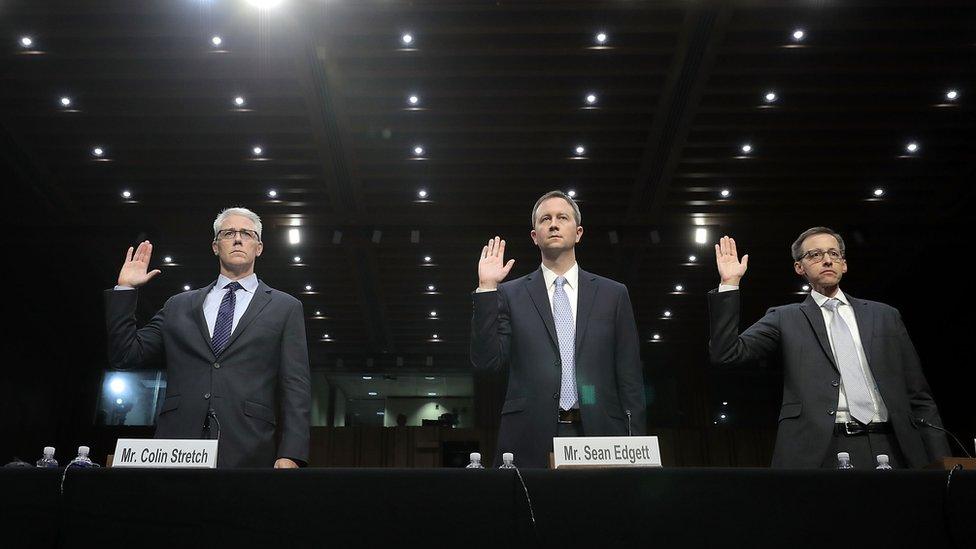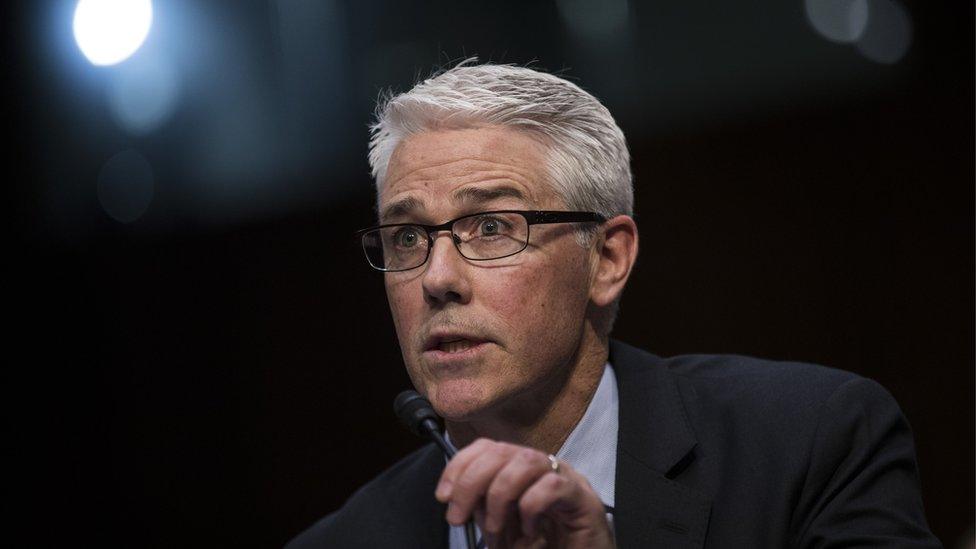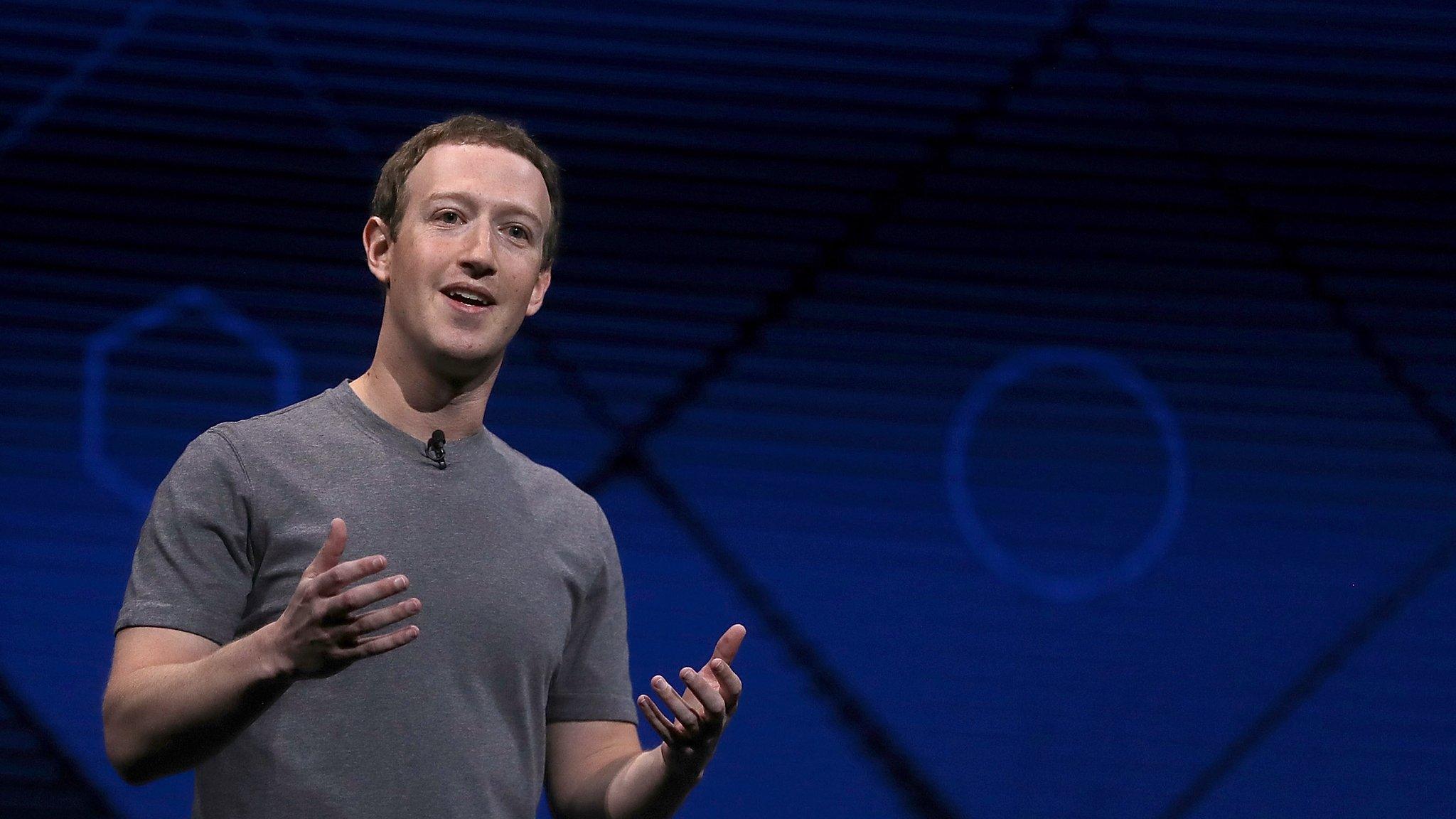Can democracy survive Facebook?
- Published

Facebook, Google And Twitter executives testify before Congress on Russian disinformation
Centuries from now, presuming they are still around and have a voice, historians will look back on the second half of the 20th century as a time when democracy flourished.
There were signature, if unstable, victories for people power over Nazism, colonialism, communism and racial injustice in Germany, post-Partition India, post-Soviet Russia, and South Africa respectively. And in the 1960s and 1970s democracy overthrew juntas from Latin America (Argentina, Brazil, Chile) to Europe (Spain, Greece).
Yet just as historians will look at the post-war world as a time when democracy thrived, they may come to look at the start of the 21st century as a democratic recession.
The impenetrable grip on power of Xi Jinping in China and Vladimir Putin in Russia has ensured strongman culture, and autocracy, rules in two rivals to Western hegemony. In the Islamic world, there has been democratic retreat in two of the great hopes - Indonesia and Turkey - and the Arab Spring has not fulfilled its early promise.
And it is in the West that democracy has taken the biggest pounding, because it was in the West that it had seemed so well set in. Authoritarians are either in control in several European states (Belarus, Hungary, Poland) or on the march in others (Austria).
But compared to when I started thinking , externalabout this subject a few years ago, a radical new threat has appeared. It is one, moreover, that was meant to be a boon to democracy, but threatens to be a burden. I am talking, of course, about big American technology companies, and specifically Facebook.
In De Tocqueville's shadow
When he wrote the seminal work Democracy in America (1835), the French diplomat and historian Alexis de Tocqueville found the idea of overthrowing the aristocracy in favour of spreading power among the people utterly irresistible.
Scholars quibble over whether he interpreted the flourishing of democracy as an inevitable fact in America. With the benefit of recent experience, we can say it is nothing of the sort.
Democracy does remain stable in the US, for now: it is competently run at national and state level, and the prospect of people being denied the vote is minimal. But democracy is a rugged fabric with unreliable threads, and in Washington and elsewhere, some are starting to fray.
Voter suppression is a big issue; so too is a hyper-partisan media that prefers heat to light; and a lobbying industry that is rampant and mostly serves the rich. Moreover, the Constitution contains immense wisdom, but needs an update.
And to this list of worries we can now add the use by foreign powers of technology platforms to spread disinformation, sow division and poison the public domain.

Colin Stretch, general counsel at Facebook, is questioned by a US Senate Judiciary Subcommittee about attempts by Russian operatives to spread disinformation and purchase political ads.
We discovered this week that 126 million Americans could potentially have seen around 80,000 posts originating with the Internet Research Agency, a troll factory emanating from Russia.
That came in leaked testimony ahead of the appearance before Congress of senior executives from Facebook, Google and Twitter.
Google, commenting for the first time on an internal investigation, said it had discovered ads looking suspiciously Russian, and 18 YouTube channels also linked to the Kremlin. Meanwhile Twitter found 2,752 accounts linked to Russian mischief - ten times more than they had previously indicated to lawmakers.
Anti-social media
It is vital to keep a sense of perspective about this. As my distinguished colleague Mark Frankel has pointed out, the large figure of 126 million is the potential reach of these ads.
That doesn't mean all those people saw them - and, vitally, even if they did see them, it doesn't mean that they would have been persuaded to vote differently. In any case, this represents a tiny fraction - 0.004% - of the immense volume of content on Facebook over a two-year period.
Why, then, ask whether Facebook represents a potentially mortal threat to democracy?
For four reasons in fact. Facebook's response to this crisis shows a company grappling with what it has unleashed; the threat from filter bubbles; the immense volume of data online; and because of a pattern of exploitation of this social media platform around the world.
Let's take these in reverse.
In September, it was revealed that Bell Pottinger behaved disgracefully in South Africa, poisoning the well of public debate. The company has apologised profusely and been split up.
What we know is that social media was a vital tool, external for this propaganda exercise, and it stands to reason that, because Facebook has the most users of any social media platform, it is most attractive to propagandists.
As to the question of data, this weekend John Lanchester wrote the cover piece, external for The Sunday Times Magazine, in which he argued that Facebook was the biggest surveillance enterprise in history, and could destroy civilisation.
The former is true, the latter is not. It is absolutely the case that Facebook has acquired a volume of personal data which is hard to fathom. This might be seen as more of a worry for those who care about privacy than democracy; but the point about it is it could get into the wrong hands.
Companies like Facebook sell advertisers personal data that we have all readily given them. They say they go to great pains to keep it safe, and would never sell it to unsavoury types. But insiders from Cambridge Analytica to the Kremlin are already using this data to micro-target voters.
As to the threat from online echo chambers, so much has been written about this that I feel I won't add to it here. Suffice to say there is a real danger that people live in walled gardens online, exposed only to information that reinforces their prejudices.
That's why we might call it anti-social media - though of course it's not Facebook's fault that we like to follow who we like to follow.
A pattern emerges
It is in the corporate handling of these unfolding crises that Facebook gives the clear impression of having unleashed something it can't control.
I thought Dylan Byers of CNN put it rather well in a tweet t, externalhis week. He wrote: "FACEBOOK timeline: - didn't happen; - happened, but was small; - ok, semi-big; - ok, it reached 126 million, but no evidence it influenced them."
Similarly, last year Mark Zuckerberg described as a "pretty crazy idea" the notion that fake news swayed the election. He has subsequently softened his language dramatically - just as, on the question of whether or not Facebook is a media company, his language has evolved extremely quickly.

Founder Mark Zuckerberg says Facebook is making political ads more transparent.
In a series of posts on Facebook, Zuckerberg has explained the measures Facebook is taking to address this issue - primarily by making political ads more transparent. , external
A clear pattern is emerging, of Facebook responding to criticism by dismissing it while re-stating its founding mission, only to come around and admit that the critics may have had a point.
It is worth saying in defence of the company, that it's declared mission - which Facebook workers are forever repeating - of making the world more open and connected has indeed been hugely successful in achieving those professed aims.
Facebook is a free product, which billions of users enjoy (and indeed are often addicted to), which innovates with extraordinary proficiency, is exceptionally good at selling ads, and which has improved countless lives.
When we criticise Facebook for allowing Russians to influence elections, we should remember that it also connects some of the poorest people on the planet with family on the other side of the world.
And given so much of the information it spreads is of high quality, there are countless ways in which the company has benefitted democracy.
But as they testify before Congress - and note by the way that none of the companies have sent their CEOs - these tech giants are starting to look like they are losing control. That is especially true of Facebook, because it has grown the fastest.
Started just 13 years ago in a Harvard dormitory, the company has created unimaginable oceans of data, acquired phenomenal wealth - and become a platform that can be exploited by those who would subvert the democratic process.
In the long history of the rise and decline of democracy, this is the newest and most unpredicted threat.
Democracy will survive Facebook. But elections are the beating heart of any democracy, and Facebook has acquired the power to give democracies a heart attack.